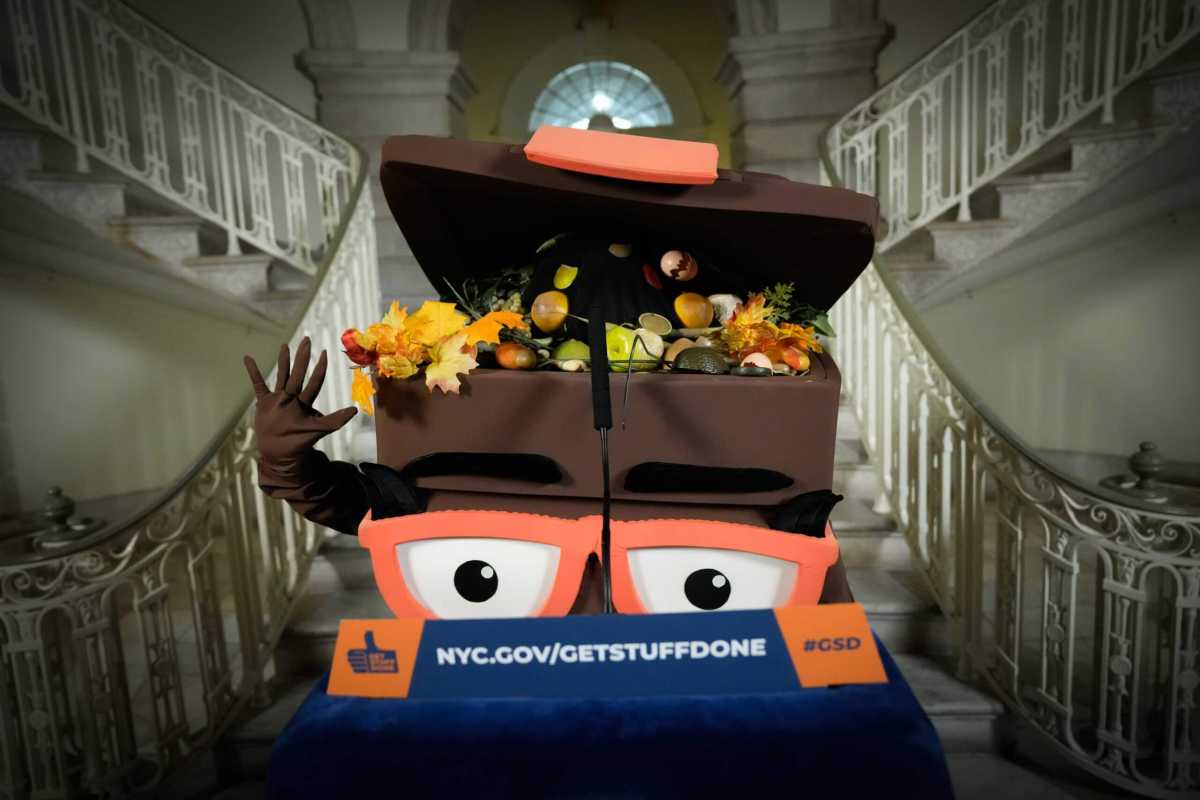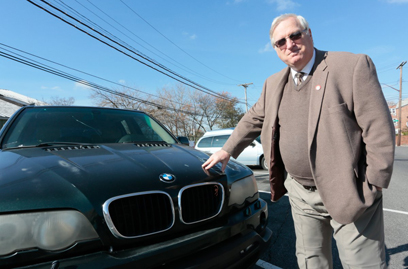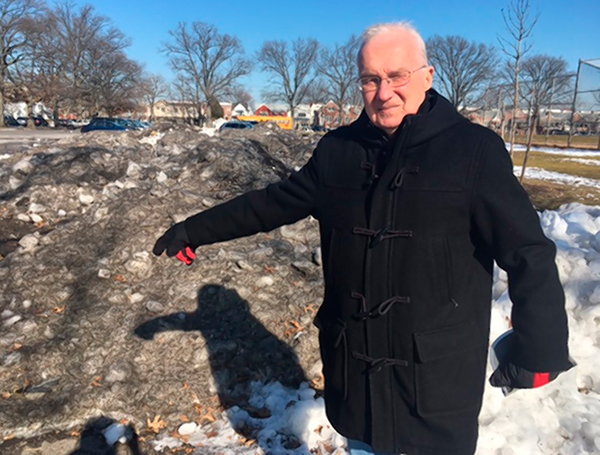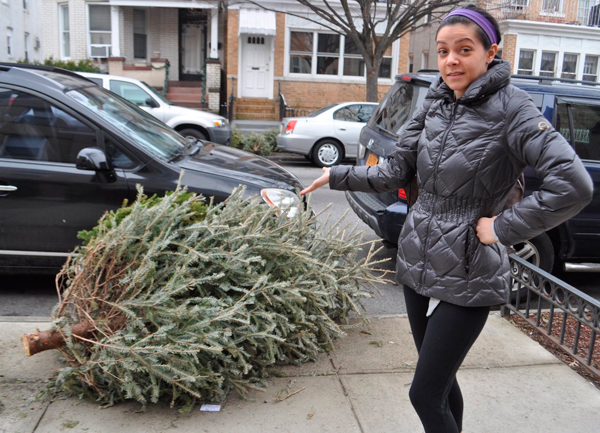New York City’s Department of Sanitation is set to roll out curbside compost pick-up to all households in all five boroughs over the next 15 months, and they’re starting right here in Brooklyn.
Starting on Oct. 2, Brooklynites will be able to put their compost at the curb just like their regular garbage and recycling so DSNY can cart it away to be processed. By next October, curbside compost pick-up will be available in all five boroughs – in what Mayor Eric Adams has said will be the largest compost collection program in the U.S.
Separating organic matter from garbage that is destined to end up in landfills is an accessible way for New Yorkers to take part in more climate-conscious practices. Separating things like kitchen scraps, garden debris, leaves, paper and cardboard boxes from garbage gives the organic matter a chance to gain a second life of sorts.
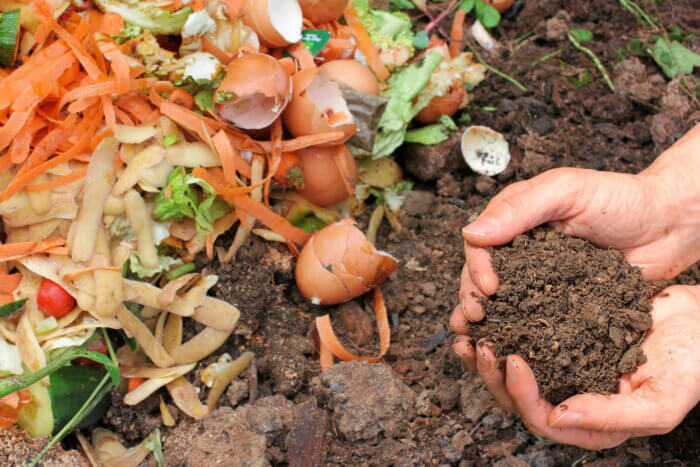
“When compostable materials are sent hundreds of miles away to landfills, they emit methane, a greenhouse gas far more dangerous to the environment than carbon dioxide,” said Vincent Gragnani, press secretary for the DSNY. “Compost facilities instead turn this material into nourishment for parks and gardens, while anaerobic digesters capture this biogas and use it in place of fossil fuels to heat homes.”
According to the United States Environmental Protection Agency, composting is part of the natural process of decomposition, in which organic matter begins to break down over time and converts into a nutrient-rich fertilizer which can be added to soil to improve its physical, biological and chemical properties.
The process to convert organic material into compost is aerobic, meaning it requires oxygen to fully carry out the cycles of decomposition. When compostable materials end up in a normal landfill, they end up squashed and deprived of air — resulting in the release of methane gas.
Large-scale compost collection will not only offer residents another way to implement more eco-friendly practices — officials hope that sorting out the waste that typically attracts rats and other pests will cut off their food supply and reduce the city’s rat population.
In the past few years, DSNY has launched several other composting projects. A smaller-scale curbside composting project, which ran in only a handful of neighborhoods, was suspended due to pandemic-related budget cuts in 2020. The program was restored, bit by bit, in 2021 — starting in Brooklyn’s Community Board 6 — but never expanded much further than that.
Then, in March of this year, the city launched a massively successful universal curbside compost collection program in Queens. More than 12.7 million pounds of compostable materials were diverted from landfill in the first three months of the program, and, in February, the city decided to expand the model.
Months later, the city council passed a bill introduced by Brooklyn Council Member Shahana Hanif that will make composting mandatory for all New Yorkers.
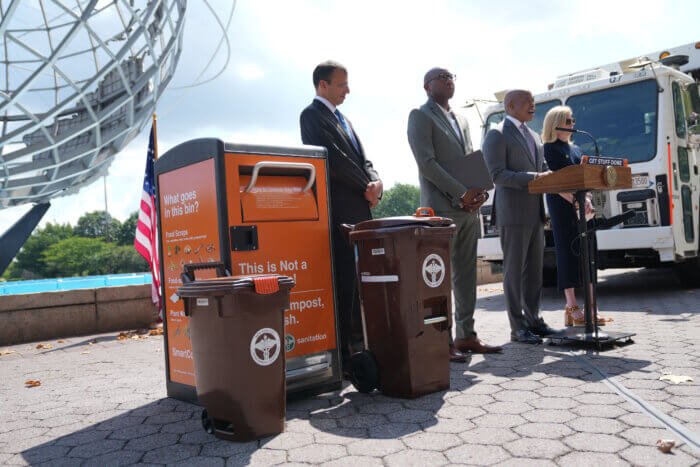
Earlier this year, “Smart Compost” bins appeared on Bed-Stuy streets for the first time — encouraging New Yorkers on the go to toss their organic trash responsibly.
DSNY had some more complex requirements in previous programs, but now the program is much more simple.
“Just give us anything from your kitchen or anything from your garden in our bin — or in your bin — once a week on your recycling day, and we’ll come pick it up,” said Gragnani. “The simplicity of this program is an effective strategy to ensure widespread participation, and widespread participation will reduce the food waste that we put into trash bags, making our streets look better and smell better, while dealing a blow to the city’s rats.”
DSNY will pick up all leaf and yard waste, food scraps and food-soiled paper including meat, bones, dairy, prepared foods and greasy uncoated paper plates and pizza boxes.
This service aims to be far more expansive than many community garden compost services which usually do not accept meat, dairy or bones to avoid rats and other vermin.
Leaves and yard waste can go into either the DSNY’s brown compost bin or any labeled bin that does not exceed 55 gallons in size. Yard waste will also be picked up if left curbside in a paper lawn or leaf bag or clear plastic bag. Food scraps must be in secured bins — not just in bags — and DSNY suggests lining the bin with a clear plastic or compostable bag.
Waste such as diapers, personal hygiene products, animal waste, plastic wrappers, non-paper packaging and foam products cannot be composted and should be disposed of through regular garbage collection.
Compost is often used to fortify soil in city parks and gardens, and is sometimes given away to New Yorkers who wish to use it in their own homes — but that’s not the only option. Some compost is sent to anaerobic digesters, which essentially turn waste into energy.
These anaerobic digesters act as a sort of stomach. Organic matter is placed in a sealed container where bacteria breaks down the matter without the presence of oxygen. The result is an output of biogases like methane, carbon dioxide and hydrogen sulfide which can be used as fuel or heat.
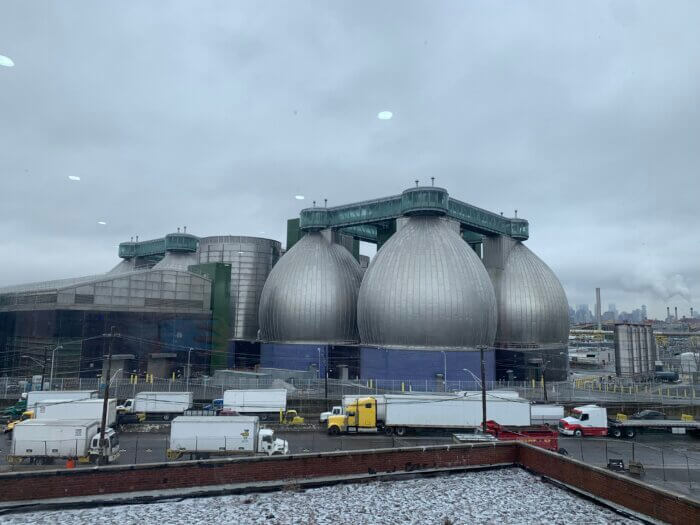
In Brooklyn, the Newtown Creek Wastewater Treatment Plant has several large digester eggs in which compostable organic matter is converted to both biogas and digestate — the residual material left behind after the compost is broken down.
According to a study by the Environmental and Energy Study Institute, 100 tons of food waste processed by anaerobic digesters per day translates to enough energy to power up to 1,400 homes each year.
Residents interested in joining the pickup program are encouraged to order a free brown compost bin through the DSNY webpage, or can use their own labeled bin as long as it meets the department’s specifications. Sign-up is not required — just start setting out your compost in on the designated date and it will be picked up! Find your neighborhood pick up schedule here.
Last updated Sept. 21, 2023 3:51 p.m.


